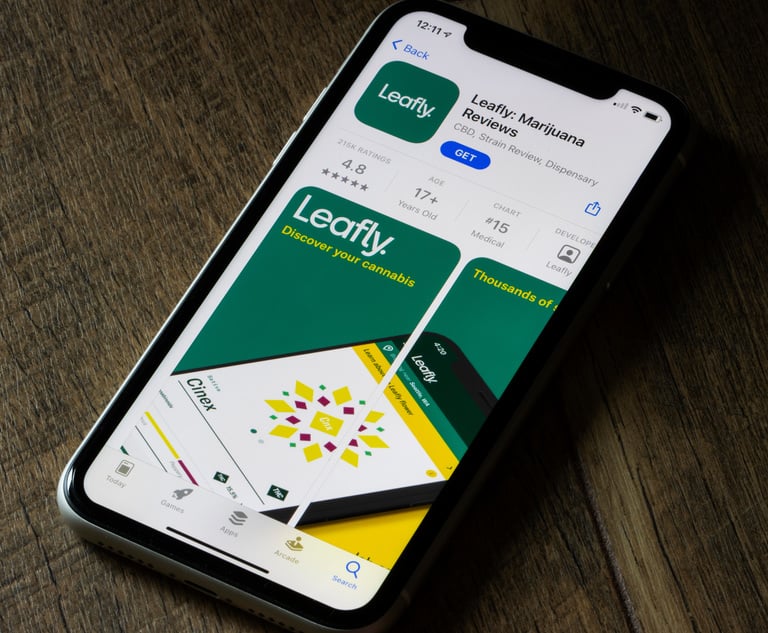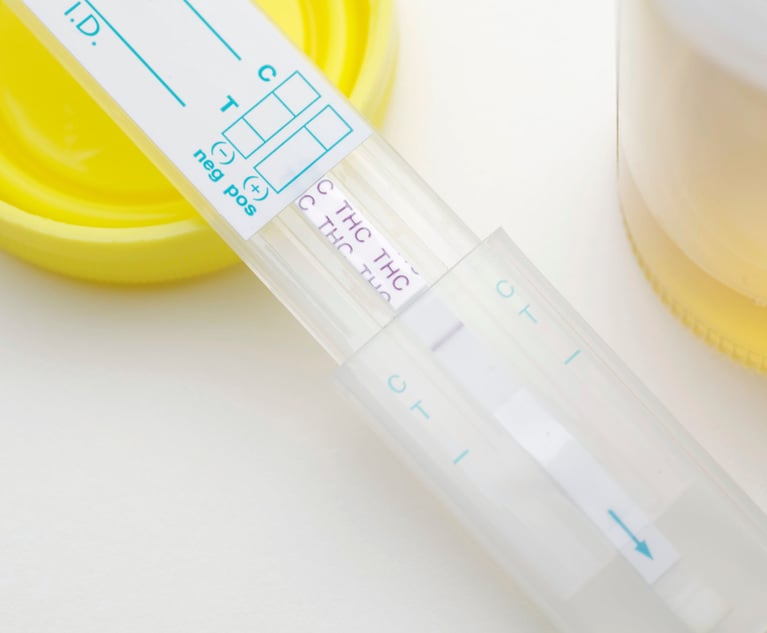Higher Law: Marijuana Goes to the Polls | A Patent Claim Target Fights Back | Who Got the Work
A look at the ballot initiatives that could legalize recreational marijuana in Michigan or sanction medical marijuana in Missouri. Plus, Pure Hemp Collective, the Colorado manufacturer of cannabidiol-containing health products, says patent claims asserted against the company are "clearly invalid."
November 01, 2018 at 04:00 PM
9 minute read
Welcome back to Higher Law, our weekly briefing on all things cannabis. I'm Cheryl Miller, reporting for Law.com from Sacramento. Hope your marijuana stock portfolio is recovering after the recent market drubbing.
This week, we're prepping for next week's election by looking at four states' marijuana ballot initiatives. Also, the target of a cannabis-related patent claim fights back. And scroll down to see Who Got the Work.
Thanks as always for reading, writing and sending tips.You can send me pics of your “I voted” stickers at [email protected] or you can call me at 916-448-2935. Follow me on Twitter at @capitalaccounts.
➤➤ Would you like to receive Higher Law as an email? Sign up here.
Pot at the Polls
The general election is finally upon us and by the morning of Nov. 7, the U.S. could have two more states (for a total of 33) that allow medical marijuana and two more (for a total of 11) that regulate recreational cannabis. Here's a snapshot of the ballot issues in play in those four states.
Michigan. With its 10 million residents, Michigan is the big potential prize this election season for advocates of a licensed recreational marijuana market. Proposal 1 on the ballot would create just that, adding on to the state's existing medicinal-use program.
State regulators, already tasked with permitting medical operations, would have 12 months after the election is certified to create new regulations. That probably means the first licenses probably won't issue until early 2019, said Robert Hendricks, a founding member and the chair of the state bar of Michigan's marijuana law section.
Among the legal issues that courts may need to sort out, Hendricks said, is how the medicinal-use law jibes with new recreational regulations. For instance, will a designated caregiver, already allowed to possess up to 72 plants for five patients and himself or herself, be able to house additional plants for recreational use?
Supporters of Proposal 1 raised $2.33 million through Oct. 26, according to the Michigan Campaign Finance Network. Top backers are two Washington, D.C. groups, the Marijuana Policy Project and the New Approach PAC. Opponents, led by Virginia-based Smart Approaches to Marijuana Action and Michigan Energy First, have raised, $1.62 million.
Missouri. Voters in the Show-Me State will be asked to choose among two constitutional amendments and a statute, each of which creates a different type of medical marijuana program. So what if two or even all three of the measures pass? That “would not be ideal for Missouri,” said Armstrong Teasdale partner Eric Walter.
“The Missouri Constitution states that when conflicting measures are approved at the same election, the measure receiving the largest affirmative vote shall prevail,” Walter said. “The courts would almost certainly be asked to decide whether the measures are truly conflicting.”
The measures don't specify specific deadlines for drafting regulations, although they do call for application materials to be ready in late spring or early summer 2019, depending on which measure prevails, Walter said.
Utah. Proposition 2 would allow patients with qualifying conditions to obtain medical marijuana with a doctor's recommendation. Users could buy marijuana from a state-licensed dispensary or grow up to six plants at home. The law would ban smoking marijuana, however, and patients would have to use some other form of consuming cannabis.
Whether or not Proposition 2 passes, state legislators struck a deal with opponents and supporters to consider legislation this fall to either make adjustments to the new law or to create some sort of new medical marijuana program.
North Dakota. Medical marijuana is already legal here for patients with certain conditions. Measure 3 would legalize recreational use for all adults and create an expungement process for those with past marijuana-related convictions. With no caps on possession or cultivation, the measure could create one of the most liberal marijuana policies in the country.
A Cannabis Patent Target Speaks Out
Pure Hemp Collective, the Colorado manufacturer of cannabidiol-containing health products, says a closely watched patent infringement suit filed against it in federal court is bunk.
In filings this week in the U.S. District Court for Colorado, lawyers for Pure Hemp say the patent claims asserted by United Cannabis Corp., or UCANN, in a July complaint are “clearly invalid.”
“Given the extreme breadth of the … Patent claims … it can be inferred that UCANN's intent is to attempt to monopolize the market for liquid CBD products through widespread use of patent infringement lawsuits against virtually any company in the liquid CBD supply chain,” Pure Hemp's attorneys wrote. “Pure Hemp just happens to be the first victim of the scheme.'
Pure Hemp is represented by Donald Emmi of Hunsaker Emmi in Golden, Colo. and James Gourley of Carstens & Cahoon in Dallas, Texas.
At issue is a Pure Hemp-manufactured cannabidiol tincture. Golden, Colo.-based United Cannabis says the remedy infringes on its 2017 patent for certain cannabidiol-containing formulations, Including one “wherein at least 95% of the total cannabinoids is cannabidiol (CBD).”
Emmi and Gourley argue that such formulations are “ubiquitous in the cannabis product marketplace,” and their answer cites companies that were selling nearly pure CBD products before United Cannabis' patent issued. Pure Hemp has asked the court to dismiss the complaint and to force United Cannabis to pay treble damages and the defendant's legal costs.
United Cannabis general counsel Jesús Vázquez told The Recorder this summer that the company's patent is valid. “Our company places a high priority on research and development and when it becomes necessary, we will protect our IP rights.” Vázquez said.
Correction: In an item last week about proposed California regs and their impacts on intellectual property, I misspelled the name of Harris Bricken attorney Alison Malsbury. I apologize for the error.
Who Got the Work
• Florida A&M University has hired veteran lobbyist and government affairs consultant Peter Harris to direct its medical marijuana projects, the Tallahassee Democrat reported. Harris, a graduate of Florida State University's College of Law, will help develop programs designed to educate minority communities about medical marijuana and the dangers of the illegal market.
• Cecily Brewster has joined Berkeley, Calif. cannabis manufacturer BAS Research as general counsel. Brewster, a member of Berkeley's cannabis commission and the former principal of The Brewster Law Office, will lead BAS' legal, government relations and compliance, the company said.
In the Weeds
>> A federal jury rejected claims by a southern Colorado couple that a neighboring, state-licensed marijuana grower sank their property's value. In a case closely watched by the cannabis industry, Michael and Phillis Reilly had argued that Parker Walton's cultivation site outside of Colorado City violated federal racketeering laws. The Reillys are represented by Washington, D.C.-based Cooper & Kirk, whose clients also include the anti-legalization Safe Streets Alliance. Walton's attorney, Matthew Buck of Red Law in Denver, argued that the Reillys' property value has actually increased since the cultivation site opened, and that any odors cited by the Reillys aren't coming from the indoor grow, which has an odor-containment system. [The Colorado Sun]
>> MedMen wants to trademark the word “cannabis” for use on t-shirts.MedMen spokesman Daniel Yi told Marijuana Business Daily that the application is similar to one the retailer successfully submitted in 2017 for a marijuana leaf design on shirts. [MJBizDaily]
>> A federal judge dismissed a southern Oregon county's lawsuit arguing that federal marijuana prohibition preempts the state's legalization laws. U.S. District Judge Michael McShane of the Oregon District said Josephine County lacked standing to sue the state in federal court. The county had tried to place retroactive limits on marijuana growers in its jurisdiction only to be blocked by the state's Land Use Board of Appeals. [AP]
>> A judge in Michigan has stopped the state—again—from shutting down unlicensed dispensaries. Court of Claims Judge Stephen Borrello said Michigan's attempts to shutter unlicensed medical marijuana businesses after Oct. 31 were “arbitrary and capricious.” Borello previously blocked the state's efforts to require all dispensaries be licensed by Sept. 15. Delays in process license applications and complaints from the medical marijuana industry have hampered a campaign to get every dispensary operating under state regulations.[Michigan Live]
>> Famed European travel guide and PBS icon Rick Steves has a side gig: marijuana legalization advocate. Steves has barnstormed the Midwest this fall promoting ballot measures in North Dakota and Michigan that would legalize recreational marijuana. Steves told The New York Times that he's no stoner, just a pro-civil liberties guy who thinks anti-marijuana laws target the poor and people of color. “I am a taxpaying, churchgoing, kid-raising American citizen,” he said. “If I work hard all day and want to smoke a joint and stare at the fireplace for three hours, that's my civil liberty.” [NYT]
Calendar – What's Ahead
Nov. 1-2 - The Marijuana Management Symposium 2018 will be held in Denver. Scheduled speakers include Andrew Freeman, Colorado's first director of marijuana coordination.
Nov. 5 - The public comment period ends for California's proposed amendments to its final marijuana regulations.
Nov. 7 - The California Cannabis Industry Association and MMLG will host SoCal Meet & Greet in Los Angeles, where organizers will recap recent amendments to the state's proposed final marijuana regulations.
Thanks for reading Higher Law. You can reach me at[email protected]. Was this email forwarded to you? Sign up here.
This content has been archived. It is available through our partners, LexisNexis® and Bloomberg Law.
To view this content, please continue to their sites.
Not a Lexis Subscriber?
Subscribe Now
Not a Bloomberg Law Subscriber?
Subscribe Now
NOT FOR REPRINT
© 2025 ALM Global, LLC, All Rights Reserved. Request academic re-use from www.copyright.com. All other uses, submit a request to [email protected]. For more information visit Asset & Logo Licensing.
You Might Like
View All
NY Cannabis Marketing Rulings / Rescheduling Effects / Honigman's Work on Trademark Suit / Goodbye
9 minute read
Workplace Weed and Labor Pacts / State AGs and Hemp / Maryland Licensing Suit / Vicente Sues Recruiter
9 minute readTrending Stories
- 1Meta Pulls Plug on DEI Programs
- 2On the Move and After Hours: Meyner and Landis; Cooper Levenson; Ogletree Deakins; Saiber
- 3State Budget Proposal Includes More Money for Courts—for Now
- 4$5 Million Settlement Reached With Stone Academy
- 5$15K Family Vacation Turned 'Colossal Nightmare': Lawsuit Filed Against Vail Ski Resorts
Who Got The Work
Michael G. Bongiorno, Andrew Scott Dulberg and Elizabeth E. Driscoll from Wilmer Cutler Pickering Hale and Dorr have stepped in to represent Symbotic Inc., an A.I.-enabled technology platform that focuses on increasing supply chain efficiency, and other defendants in a pending shareholder derivative lawsuit. The case, filed Oct. 2 in Massachusetts District Court by the Brown Law Firm on behalf of Stephen Austen, accuses certain officers and directors of misleading investors in regard to Symbotic's potential for margin growth by failing to disclose that the company was not equipped to timely deploy its systems or manage expenses through project delays. The case, assigned to U.S. District Judge Nathaniel M. Gorton, is 1:24-cv-12522, Austen v. Cohen et al.
Who Got The Work
Edmund Polubinski and Marie Killmond of Davis Polk & Wardwell have entered appearances for data platform software development company MongoDB and other defendants in a pending shareholder derivative lawsuit. The action, filed Oct. 7 in New York Southern District Court by the Brown Law Firm, accuses the company's directors and/or officers of falsely expressing confidence in the company’s restructuring of its sales incentive plan and downplaying the severity of decreases in its upfront commitments. The case is 1:24-cv-07594, Roy v. Ittycheria et al.
Who Got The Work
Amy O. Bruchs and Kurt F. Ellison of Michael Best & Friedrich have entered appearances for Epic Systems Corp. in a pending employment discrimination lawsuit. The suit was filed Sept. 7 in Wisconsin Western District Court by Levine Eisberner LLC and Siri & Glimstad on behalf of a project manager who claims that he was wrongfully terminated after applying for a religious exemption to the defendant's COVID-19 vaccine mandate. The case, assigned to U.S. Magistrate Judge Anita Marie Boor, is 3:24-cv-00630, Secker, Nathan v. Epic Systems Corporation.
Who Got The Work
David X. Sullivan, Thomas J. Finn and Gregory A. Hall from McCarter & English have entered appearances for Sunrun Installation Services in a pending civil rights lawsuit. The complaint was filed Sept. 4 in Connecticut District Court by attorney Robert M. Berke on behalf of former employee George Edward Steins, who was arrested and charged with employing an unregistered home improvement salesperson. The complaint alleges that had Sunrun informed the Connecticut Department of Consumer Protection that the plaintiff's employment had ended in 2017 and that he no longer held Sunrun's home improvement contractor license, he would not have been hit with charges, which were dismissed in May 2024. The case, assigned to U.S. District Judge Jeffrey A. Meyer, is 3:24-cv-01423, Steins v. Sunrun, Inc. et al.
Who Got The Work
Greenberg Traurig shareholder Joshua L. Raskin has entered an appearance for boohoo.com UK Ltd. in a pending patent infringement lawsuit. The suit, filed Sept. 3 in Texas Eastern District Court by Rozier Hardt McDonough on behalf of Alto Dynamics, asserts five patents related to an online shopping platform. The case, assigned to U.S. District Judge Rodney Gilstrap, is 2:24-cv-00719, Alto Dynamics, LLC v. boohoo.com UK Limited.
Featured Firms
Law Offices of Gary Martin Hays & Associates, P.C.
(470) 294-1674
Law Offices of Mark E. Salomone
(857) 444-6468
Smith & Hassler
(713) 739-1250













